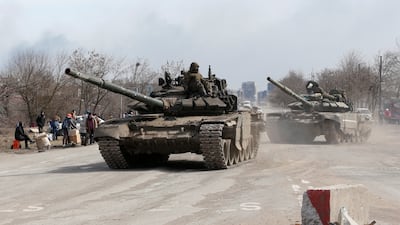Live updates: follow the latest news on Russia-Ukraine
Ukraine has rejected Russia's demands that the besieged city of Mariupol lay down their arms on Monday in exchange for safe passage out for residents.
The Russian demand came hours after Ukrainian authorities said Moscow’s forces bombed an art school that was sheltering about 400 people.
Russian forces would allow two corridors out of the coastal city, heading either east towards Russia or west to other parts of Ukraine, the Russian news agency Tass reported.
It quoted Col Gen Mikhail Mizintsev, head of the Russian National Defence Control Centre.
Mariupol residents were given until 5am Monday Moscow time (2pm GMT) to respond to the offer, Tass reported.
But Ukrainian Deputy Prime Minister Iryna Vereshchuk rejected the notion.
“There can be no talk of any surrender, laying down of arms," Ms Vereshchuk told Ukrainian Pravda. "We have already informed the Russian side about this.
“I wrote: 'Instead of wasting time on eight pages of letters, just open the corridor'.”
Previous bids to allow residents to safely leave Mariupol and other Ukrainian cities have failed or have been only partially successful, with bombardments continuing as civilians sought to flee.
Earlier on Sunday, Ukrainian authorities said Russia’s military bombed an art school in Mariupol, and tearful evacuees from the devastated port city described how “battles took place over every street" weeks into the siege.
The fall of Mariupol would allow Russian forces in southern and eastern Ukraine to link up.
But western military analysts say that even if the surrounded city is taken, the troops battling a block at a time for control there may be too depleted to help secure Russian breakthroughs on other fronts.
Three weeks into the invasion, western governments and analysts see the conflict shifting to a war of attrition, with bogged down Russian forces launching long-range missiles at cities and military bases as Ukrainian forces carry out hit-and-run attacks and try to sever their supply lines.
Ukrainians “have not greeted Russian soldiers with a bunch of flowers", President Volodymyr Zelenskyy told CNN, but with “weapons in their hands".
Moscow cannot hope to rule the country, he said, given Ukrainians’ enmity toward the Russian forces, as he called for Russian President Vladimir Putin to hold direct talks with him.
The strike on the art school was the second time in less than a week that officials reported an attack on a public building where Mariupol residents had taken shelter.
On Wednesday, a bomb hit a theatre where more than 1,000 people were believed to be sheltering.

There was no immediate word on casualties in the school attack.
Ukrainian officials have not given an update on the search of the theatre since Friday, when they said at least 130 people had been rescued and 1,300 were trapped by rubble.
City officials and aid groups say food, water and electricity have run low in Mariupol and fighting has kept out humanitarian convoys. Communications are severed.
The strategic port on the Sea of Azov has been under bombardment for over three weeks and has seen some of the worst horrors of the war. City officials said at least 2,300 people have died, with some buried in mass graves.
Some who were able to flee Mariupol tearfully hugged relatives as they arrived by train Sunday in Lviv, about 1,100 kilometres to the west.
“Every house became a target,” said Olga Nikitina, who was embraced by her brother as she got off the train. “Gunfire blew out the windows. The apartment was below freezing.”
Maryna Galla narrowly escaped with her son, aged 13. She said she huddled in the basement of a cultural centre with about 250 people for three weeks without water, electricity or gas.
“We left because shells hit the houses across the road," Ms Galla said. There was no roof. There were people injured."
She said her mother, father and grandparents stayed behind and “don’t even know that we have left".

